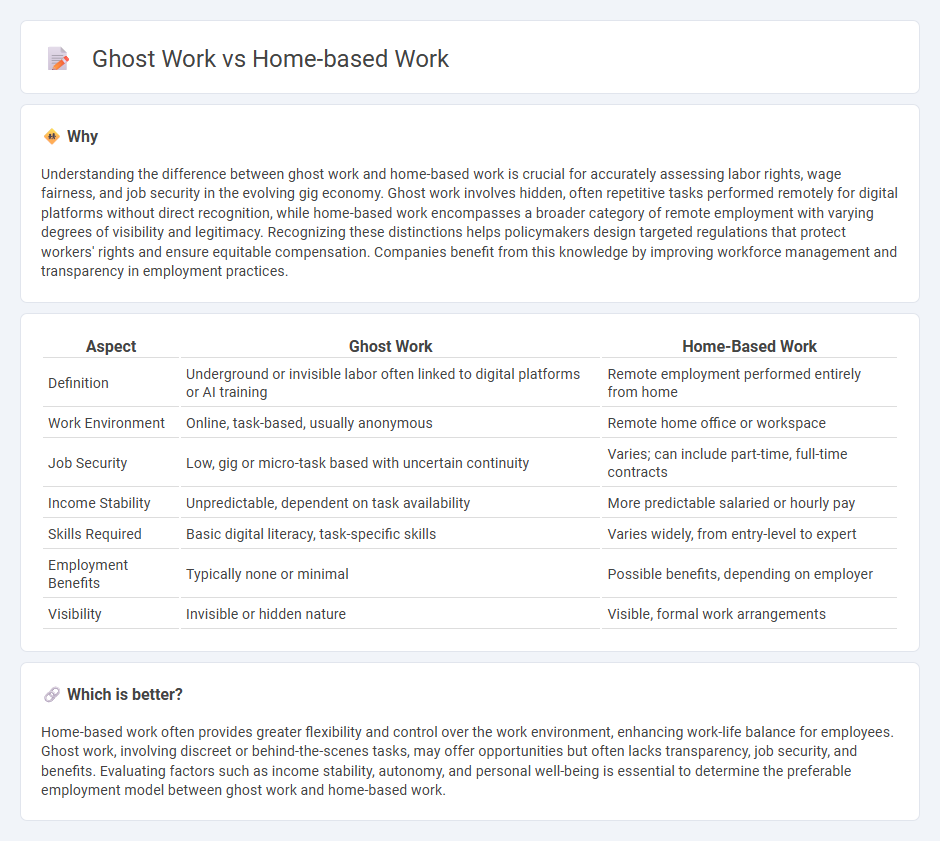
Ghost work involves tasks completed remotely, often anonymously, through digital platforms without direct employer recognition, while home-based work encompasses a broader range of jobs performed entirely from home with formal employment arrangements. The rise of gig economy platforms has accelerated ghost work, impacting income stability and worker rights compared to traditional home-based roles. Explore the distinctions and implications of these emerging work models to understand their future in the labor market.
Why it is important
Understanding the difference between ghost work and home-based work is crucial for accurately assessing labor rights, wage fairness, and job security in the evolving gig economy. Ghost work involves hidden, often repetitive tasks performed remotely for digital platforms without direct recognition, while home-based work encompasses a broader category of remote employment with varying degrees of visibility and legitimacy. Recognizing these distinctions helps policymakers design targeted regulations that protect workers' rights and ensure equitable compensation. Companies benefit from this knowledge by improving workforce management and transparency in employment practices.
Comparison Table
| Aspect | Ghost Work | Home-Based Work |
|---|---|---|
| Definition | Underground or invisible labor often linked to digital platforms or AI training | Remote employment performed entirely from home |
| Work Environment | Online, task-based, usually anonymous | Remote home office or workspace |
| Job Security | Low, gig or micro-task based with uncertain continuity | Varies; can include part-time, full-time contracts |
| Income Stability | Unpredictable, dependent on task availability | More predictable salaried or hourly pay |
| Skills Required | Basic digital literacy, task-specific skills | Varies widely, from entry-level to expert |
| Employment Benefits | Typically none or minimal | Possible benefits, depending on employer |
| Visibility | Invisible or hidden nature | Visible, formal work arrangements |
Which is better?
Home-based work often provides greater flexibility and control over the work environment, enhancing work-life balance for employees. Ghost work, involving discreet or behind-the-scenes tasks, may offer opportunities but often lacks transparency, job security, and benefits. Evaluating factors such as income stability, autonomy, and personal well-being is essential to determine the preferable employment model between ghost work and home-based work.
Connection
Ghost work and home-based work are connected through the digital platforms that facilitate remote task completion, enabling workers to perform invisible, often repetitive jobs from home. This form of employment leverages global internet connectivity to distribute microtasks such as data labeling, content moderation, and survey participation. The rise of ghost work highlights challenges in labor rights, job security, and fair compensation within the home-based gig economy.
Key Terms
Flexibility
Home-based work offers significant flexibility, allowing individuals to set their own schedules and balance personal responsibilities. In contrast, ghost work often demands rigid task completion with limited control over work hours despite being performed remotely. Explore more about how flexibility shapes the future of remote employment.
Anonymity
Home-based work often allows individuals to maintain a degree of personal anonymity by controlling their work environment and interactions, while ghost work is characterized by tasks completed invisibly for digital platforms without public recognition or identity exposure. Ghost workers contribute to data labeling, content moderation, and AI training behind the scenes, typically lacking ownership or visibility of their labor. Explore more insights on the dynamics of anonymity in remote work landscapes.
Autonomy
Home-based work offers greater autonomy by enabling individuals to set their own schedules and work environments, fostering flexibility and self-direction. In contrast, ghost work often involves repetitive tasks controlled by algorithms with limited decision-making power and little visibility or recognition. Explore more to understand how autonomy shapes the future of work in these evolving labor models.
Source and External Links
Work from home jobs with Foundever(tm) - Offers 100% remote customer service jobs that require working from a dedicated home office with flexibility to achieve work-life balance, including options for hybrid work as well.
Amazon Work From Home & Remote Jobs - Provides some customer service and corporate roles with partial or full remote work potential, although most hourly jobs require on-site presence.
Home Based Jobs, Employment in California - Lists thousands of home-based job opportunities in California across various fields such as proofreading, customer service, and mental health therapy.
 dowidth.com
dowidth.com